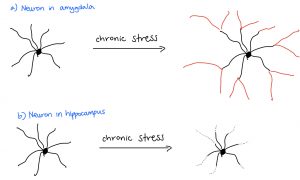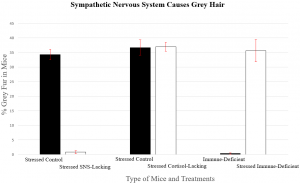You may have heard of the saying, “diamonds are made under pressure”, especially from people working last-minute to meet deadlines. However, a study found that the stress accompanying our seemingly never-ending tasks actually decreases our ability to produce high-quality work, or to perform well on exams.
The study showed that upon chronic stress, neurons shrink in the hippocampus, which is the region in the brain that controls our memory; this equates to a weaker memory. Furthermore, neurons end up growing in the amygdala, which is the region in the brain that reinforces our fears; this translates to an increase in anxiety levels.

Figure 1. Chronic stress promotes the growth of neurons in the amygdala (a), and leads to the shrinkage of neurons in the hippocampus (b). Created by Athena Wang. Adapted from Davidson and McEwen (2012).
Therefore, instead of studying a week before exams when stress levels are the highest, you should space out your studying throughout the semester to retain as much information as possible while also being more calm.
ACUTE VS. CHRONIC STRESS
A bit of stress can be good for us; acute stress triggers our fight-or-flight response, and helps us overcome short-term stressors. However, chronic stress weakens our immune system, and leads to even more troubles, such as mental health and cardiovascular problems. Therefore, stress should be dealt with before it escalates.
WAYS TO RELIEVE STRESS
Good time-management skills are important, so that you don’t end up with a plethora of assignments due at the same time. Designate and follow the allotted times for your tasks, and hopefully having a better control over your time will decrease stress.
Another way is to practice mindfulness. This type of meditation makes you embrace your current situation and not dwell on unnecessary worries, which then allows you to feel less stressed. Lastly, incorporate enjoyable activities in your schedule to improve your mood and help you relax.
The next time you’re feeling stressed out, don’t let it get the best of you. Take a deep breath, and remember that you’ve got this!
Any additional tips? I would love to hear your thoughts in the comments below.
-Athena Wang


